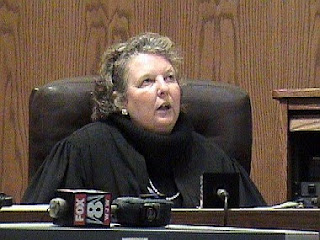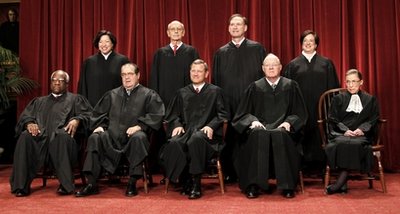
JUSTICE WILL BE SERVE

The Supreme Court Justices of the United States sit for a formal group photo in the East Conference Room of the Supreme Court in Washington on October 8, 2010. The Justices are (front row from left) Clarence Thomas, Antonin Scalia, John G. Roberts (Chief Justice), Anthony Kennedy, Ruth Bader Ginsburg; (back row from left) Sonia Sotomayor, Stephen Breyer, Sameul Alito and Elena Kagan, the newest member of the court. On my web page I'm going to be talking about Judges. Juvenile Judges and Criminal Judges and Supreme Court Judges I think they are the best. They do anything and mostly everything they want. Most importantly, they are fair in all ways. I'm going to be giving u updates of Judges and how the judicial system work. Trust me it's not like T.V Judges it's a whole different thing.
Saturday, July 17, 2010
WHAT HAPPENS AT A ARRAIGNMENT

3. This proceeding is called an arraignment. The principal purpose of arraignment is for you to enter a plea to the charges. Before taking your plea, I will advise you of your rights and options. I will advise you of the offense(s) you are charged with and will give you a copy of the criminal complaint or citation if you do not already have one. At that point, you will enter a plea to the charges.
4. You have the right to:
* Plead not guilty;
* A trial on the charge(s);
* Be released on bail, if you are still in custody;
* The assistance of an attorney at all stages of the case. If you cannot afford to hire an attorney, the court may appoint an attorney to represent you if you qualify for such representation.
* See and hear the witnesses at trial and to cross-examine them or ask them questions;
* To present evidence in your own behalf;
* To have the court issue subpoenas for you directing your witnesses to be in court for trial and to testify;
* To remain silent and not be forced to incriminate yourself. That means that you are never required to testify. And,
* To be presumed innocent until the prosecution proves your guilt beyond a reasonable doubt. You are not required to prove anything. The prosecution must prove the charge(s) and must do so beyond a reasonable doubt if the case goes to trial.
5. Do you understand these rights? Do you have any questions about these rights? [If the court is uncertain that the defendant understands any of these rights, the court may ask the defendant to explain what had just been stated: e.g. “Could you please explain to me how you understand what I have just told you? I want to be certain that you are clear about what I have said.”]
6. [If the defendant does not have counsel, you must determine whether the defendant is entitled to court-appointed counsel. ]
Do you understand that you have the right to have an attorney represent you and that if you cannot afford an attorney, one may be appointed for you if you qualify for such representation?
[If no, rephrase the question.]
[If yes, ask]: Can you afford to hire an attorney or consult with an attorney for advice?
[If yes, determine whether the defendant wants an attorney]: Do you want to hire or consult with an attorney?
[If yes, reset the arraignment for a week later to allow the defendant a reasonable opportunity to hire an attorney or consult an attorney for advice.]
[If no, determine whether the defendant is making a knowing, intelligent, and voluntary waiver of counsel by asking the following questions]:
* Do you understand that if you are convicted you may be sentenced to jail?
* Do you understand the consequences of waiving counsel?
* Is your decision to waive counsel made voluntarily, without threats or coercion?
* Do you wish to waive your right to an attorney and represent yourself?
[If yes to all questions, have the defendant sign a Waiver of Counsel form, Criminal Form 9-401A, and continue with the arraignment.]
[If no, ask]: Do you wish to request a court-appointed attorney?
[If yes, you must make an indigency determination and appoint counsel if indigent.]
[If no, you must determine whether the defendant is making a knowing, intelligent, and voluntary waiver of counsel by asking the following questions]:
* Do you understand that if you are convicted you may be sentenced to jail?
* Do you understand the consequences of waiving counsel?
* Is your decision to waive counsel made voluntarily, without threats or coercion?
* Do you wish to waive your right to an attorney and represent yourself?
[If yes to all questions, have the defendant sign a Waiver of Counsel form, Criminal Form 9-401A, and continue with the arraignment.]
7. Have you received a copy of the criminal complaint or citation? [If no, provide the defendant a copy.]
8. You are charged with .
[Read the ordinance(s) aloud.]
9. Do you understand the charge(s)?
10. [NOTE: If the charge is DWI or Aggravated DWI, you must inform the defendant of the maximum and mandatory minimum penalties for a first, second, and third offense
Thursday, July 15, 2010
GUN RIGHT LAW NOW IN ILLNOIS !!!

Alderman Rey Colon, whose brother was fatally shot in 1979, said the justices on the nation's top court didn't understand the reality of the inner city. "I understand the right to bear arms, but I also understand parents crying in their sleep," he said.
On Monday the high court overturned 19th century rulings that said the 2nd Amendment restricted only federal gun laws, not local or state measures. In a 5-4 decision, the justices said the right to have a handgun for self-defense is "fundamental from an American perspective [and] applies equally to the federal government and the states."
It will be 10 days before the new ordinance becomes city law. Then anyone who wants to get a handgun must obtain a Chicago firearm permit.
People who have committed violent crimes, or have two or more convictions for driving under the influence of alcohol or drugs, will not be allowed permits.
Key provisions of the ordinance:
•Firearm sales will be banned in the city.
•Gun training totaling four hours in a classroom and an hour on a firing range will be required before getting a permit. But firing ranges are banned, so training must be completed outside Chicago.
•To transport a gun, it will have to be "broken down," not immediately accessible, unloaded, and in a firearm case.
•Firearms may be possessed only inside the dwelling. It will be illegal to have a gun in the garage, on the front porch or in the yard. Guns also will not be allowed in hotels, dorms and group-living facilities
On Monday the high court overturned 19th century rulings that said the 2nd Amendment restricted only federal gun laws, not local or state measures. In a 5-4 decision, the justices said the right to have a handgun for self-defense is "fundamental from an American perspective [and] applies equally to the federal government and the states."
It will be 10 days before the new ordinance becomes city law. Then anyone who wants to get a handgun must obtain a Chicago firearm permit.
People who have committed violent crimes, or have two or more convictions for driving under the influence of alcohol or drugs, will not be allowed permits.
Key provisions of the ordinance:
•Firearm sales will be banned in the city.
•Gun training totaling four hours in a classroom and an hour on a firing range will be required before getting a permit. But firing ranges are banned, so training must be completed outside Chicago.
•To transport a gun, it will have to be "broken down," not immediately accessible, unloaded, and in a firearm case.
•Firearms may be possessed only inside the dwelling. It will be illegal to have a gun in the garage, on the front porch or in the yard. Guns also will not be allowed in hotels, dorms and group-living facilities
Subscribe to:
Comments (Atom)